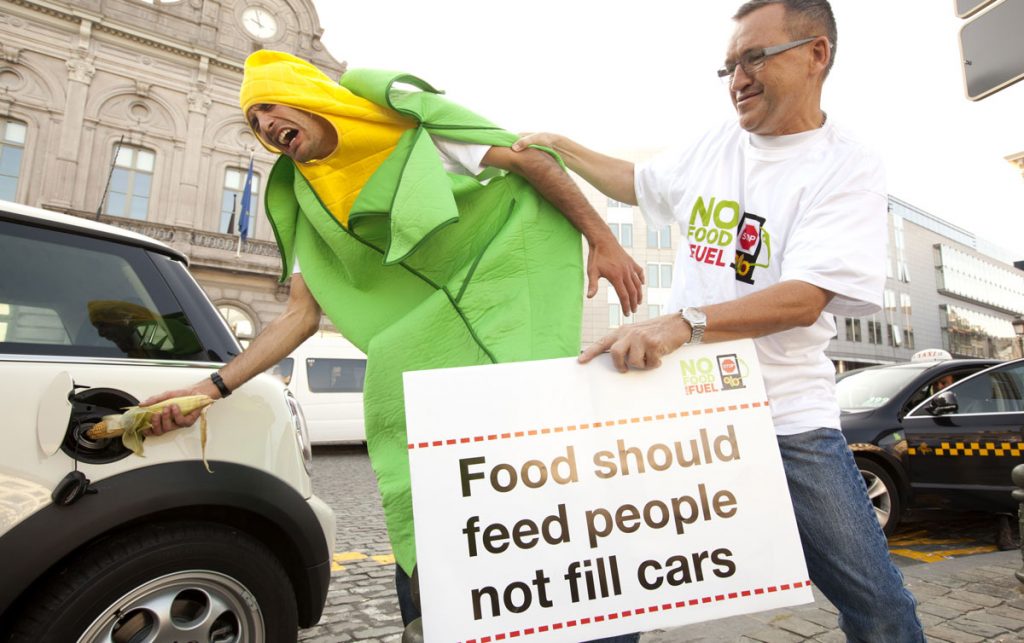Civil society organisations today blamed governments at the Committee on World Food Security for defending the biofuels industry rather than the people pushed into hunger by biofuels policies.
These organisations believe that expert evidence, which clearly showed that biofuels targets aggravate food price volatility and increase hunger, was ignored. Governments acknowledged that biofuels crops compete with food crops and influence food prices but did not recommend any action to stop it. Instead, the governments of North America, Australia and the EU systematically deleted any references to human rights, or links between biofuels and land grabbing or food price spikes.
The domination of pro-biofuel countries, spearheaded by the EU, has resulted in decisions heavily favourable for the expansion of the biofuels market. Governments including Egypt, Jordan and China who spoke expressing strong misgivings have also largely been ignored.
Robbie Blake, biofuels campaigner for Friends of the Earth Europe, said “Experts agree that burning food for biofuels is not a ‘green’ solution. It fuels hunger, land grabs and climate change. Yet, under intense pressure from a subsidy-hungry biofuel industry, the UN Committee on World Food Security has today ignored the obvious: that to reduce pressure on land and food we must stop using food for fuel for the rich.”
In June the High Level Panel of Experts, on the request of the Committee on World Food Security [1], released its report on biofuels policies to inform the negotiations [2].
The report clearly concluded that there is a link between the energy policy and food insecurity and that biofuels have been a key driver behind steep food price spikes and food price volatility in recent years. It said: “Everything else being equal, the introduction of a rigid biofuel demand does affect food commodity prices.”
Other independent research such as by the European Commission has confirmed similar findings [3]. And the OECD, World Bank, IMF, World Trade Organisation and UN Food and Agriculture Organisation in 2011 called on ministers of G20 countries “to remove provisions of current national policies that subsidize (or mandate) biofuels production or consumption” [4]. All this advice was ignored.
Kirtana Chandrasekaran, food sovereignty coordinator for Friends of the Earth International, said: “Small scale food producers have spoken powerfully here about the reality they are confronted with every day: that biofuels crops compete with their food production, for the land they work and for the water that sustains them. They called on this assembly to take action to defend the right to food from the impacts of biofuels; instead the recommendations overwhelmingly defend the interests of the biofuels industry and legitimise violations of the right to food.”
Estimates suggest about six million hectares of land in sub-Saharan Africa is already controlled by European biofuel companies and about 293 land grabs covering more than 17 million hectares worldwide have been reported due to biofuels.
On Monday more than 80 civil society organizations sent a letter to Committee on World Food Security members warning that the current recommendations would fail to uphold the Right to Food or stop hunger caused by biofuels. [5]
***
Notes
[1] The Committee on World Food Security (CFS) serves as a forum in the UN System for review and follow-up of policies concerning world food security. Civil Society participates at the CFS through the largest international mechanism of civil society organizations seeking to influence agriculture, food security and nutrition policies and actions. The mandate and spirit of the reformed CFS is to create a body that includes all countries and stakeholders. A Global Strategic Framework rooted in the Right to Food is at the heart of the reformed CFS and provides clear guidance to coordinate actions on food security and nutrition.







